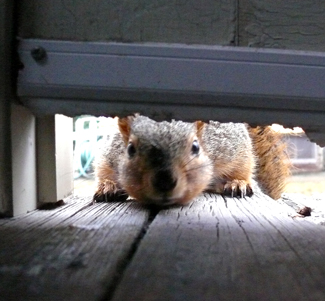Keeping Squirrels Away From Your Home
By Chris Williams on April 3, 2015.
 John Maher: Hi, I’m John Maher. Today I’m here with Scott Winsper of Colonial Pest Control. Scott is a Wildlife Technician. Today we’re talking about keeping squirrels away from your home. Welcome, Scott.
John Maher: Hi, I’m John Maher. Today I’m here with Scott Winsper of Colonial Pest Control. Scott is a Wildlife Technician. Today we’re talking about keeping squirrels away from your home. Welcome, Scott.
Scott Winsper: How you doing, John?
Most Effective Way to Keep Squirrels Away from Your Home
John: Good. Scott, what’s the most effective way to keep squirrels away from my home?
Scott: John, that’s a good question. Every house is different. To keep gray squirrels away from your home, first of all, keep food sources away. Get rid of your bird feeders. Bird feeders are the biggest thing for gray squirrels. They love bird feeders. Also, if you’ve got a good oak tree that’s pushing off a lot of acorns and nuts during the fall months, those trees should be cut down.
Other sources like that, where there’s a food source — most often I’d probably say to keep squirrels away — it’s very difficult to keep gray squirrels from your home away. Most of the time, we’re building homes in the areas where they’re living, so it’s very difficult.
I most recommend to try to keep food sources most away, oak trees away from the house close to your home, and bird feeders.
Squirrel Damage to Homes
John: Can gray squirrels cause significant damage if they do get into my home?
Scott: Most definitely, John. There are several things they can do. First of all, they’ll chew holes in your soffit areas getting into your house. They’ll chew on your wires in your house. They’ll ruin your insulation in your house, urine stains, fecal matter. There are several things that they can do to damage your home.
John: Where are gray squirrels most likely to enter and nest in my home?
Scott: It all depends where entry points are in the home, where the tree lines meet, where your power lines come in. But most commonly, they come in your gable vents, your roof junctures, soffit corners. Those are the areas they’re going to try to get into.
Can you seal your home against squirrels?
John: Are there things that I can do to try to seal up my home when they’re getting into those little joints and cracks in the home?
Scott: Like I said, gray squirrels are very difficult to keep them away from your home. They’re chewers. They like to chew their way in, so if they want to get into the home, they’re going to chew their way in the home.
John: Even if I had it sealed up, they’re just going to find a way to get in.
Scott: It’s very, very difficult. The best thing to do is trap and remove the gray squirrels.
Are gray squirrels dangerous?
John: Are gray squirrels dangerous? Do I need to be careful about being near them?
Scott: Mostly, gray squirrels are more scared of you when you’re going towards them. But if you’re going to try to catch them or handle them, they’re going to bite you, most definitely. The first instinct is anything — you back it in the corner, it’s going to attack, and that’s what a gray squirrel is going to do. You put your hand on it, or try to remove it, it’s going to attack you, and it’s going to bite you.
Signs of Squirrels in a Home
John: Right. What are some signs that I have gray squirrels in my home?
Scott: Most common thing I can tell you to do, walk around the outside of your home. When you walk around the outside of the home, usually look on the ground. What I mean by looking on the ground is that usually when a gray squirrel enters your home, it’ll chew a hole on the outside of your soffit, and it’ll push out some of the insulation, and you’ll see the insulation on the ground.
When you see insulation on the ground, look up. That’s usually where the entry point is where the gray squirrels are coming in.
John: So it’s right up there where the roof meets the side of the house.
Scott: Just like I said before, John, gable vents, roof junctures, dormers, ridge vent ends, any of those areas, they’ll chew their way in to get in. Anything that has a leak source. Anything that’s going to leak air current, or warm air; they’re going to chew their way in.
John: All right. That’s good advice, Scott. Thanks very much for speaking with me today.
Scott: Thank you, John.
John: For more information you can visit the Colonial Pest Control website at ColonialPest.com or call 1‑800‑525‑8084, that’s 1‑800‑525‑8084.
Photo credit: John Winkelman / Foter / CC BY
Stay up-to-date with Colonial Pest’s email newsletter!